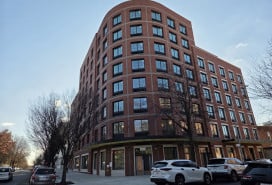What can I do if my condo building goes rental?

It's a rare situation, but developers do have the right to convert their buildings to rentals.
I’m considering buying in a new development, but I've heard that sometimes in a downturn when there are too many unsold condos, buildings will go rental. How do I protect myself in case the owners decide to do this?
This is an unusual situation, but a developer does have the right to convert a condo building to a rental, which could affect your apartment's value, our experts say.
If a developer is struggling to sell condo units during an economic downturn, it's not unheard of for them to convert the apartments to rentals. Before you buy, take a close look at the development's offering plan to find out whether this is even a possibility.
"If the sponsor of the conversion has reserved the right to rent apartments in lieu of selling them in a condominium offering plan, a unit purchaser has no way to prevent the developer from renting its units," says Jeffrey Reich, a partner in the law firm of Schwartz Sladkus Reich Greenberg Atlas. "However, developers usually have strong financial incentives to sell rather than rent their units."
If the developer is compelled to sell units at a discount, it could negatively affect the value of your own apartment. And in a down market, a rental conversion is not out of the question. This could happen after the developer sells the required 15 percent of units in the building and then decides to keep the rest of the units as rentals.
This scenario comes with a number of risks to condo owners.
"If the sponsor goes bankrupt and stops paying common charges on the units they own, this would destroy the financials of the building, possibly leaving the tenants without the services they expected such as the doorman, super, etc," explains Mark Chin, CEO of real estate brokerage KWNYC. "You saw this sort of situation in the last downturn in Miami, where a lot of owners just walked away from their units and the few people in the building left had to pay for more than they bargained for."
Another unfortunate outcome of converting condos to rentals is that the concentration of ownership will be high, making financing difficult and therefore limiting your resale possibilities, Chin adds.
Keep in mind that a rental conversion will not change the building's status as a condo—or yours as a homeowner.
"Once the developer declares the conversion plan 'effective,' records the condominium declaration, and conducts the first sale, the building is a condominium and that fact is not changed if the developer decides to rent its apartments," Reich says. "As long as the developer continues to update the offering plan, the developer is free to resume sales at any time."
Consulting a real estate attorney before you close a deal will help protect you should any of these scenarios arise.
"There are all sorts of things in a new development's offering plan that only a real estate attorney will be able to decipher properly," says Deanna Kory, a broker with Corcoran. "The attorney you hire should be someone who is very familiar with these types of transactions."
You should also find out how far the building is into its sales cycle.
"If over half of the building is already sold, I would say you're in pretty good shape," Chin says. "You could also try to put a contingency in the purchase and sale contract stating that you have the right to rescind if the building doesn't get to a certain percent sold in a set period of time. That would be effective, but your deposit could be tied up for a while and the developer would likely not agree to that stipulation."
Trouble at home? Get your NYC apartment-dweller questions answered by an expert. Send your questions to [email protected].
For more Ask an Expert questions and answers, click here.
You Might Also Like




























